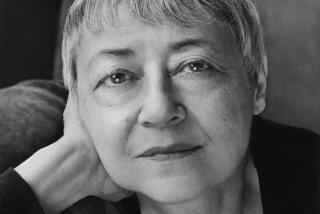A London Student’s Bleak Struggle Away From Poverty : AN EXPERIMENT IN LOVE by Hilary Mantel; Henry Holt $23, 250 pages
- Share via
Thirty years after “The Girls of Slender Means,” Muriel Spark’s blithe and painful novel of genteelly struggling young women in a London hostel, slender has turned to starved. Technically, the young women in Hilary Mantel’s novel may be genteel--all are at university--but their struggle is brutish, nasty and, in one case, short.
The difference is not so much in plot and circumstances. There is little in “An Experiment in Love” that could not have been in an early Spark book, other than much more sex much less enjoyed. What 30 years have altered is the voice and the music. Spark’s was lilting balladry through which hard things showed; Mantel’s is a grunge moan.
Starvation is a central image throughout Carmel McBain’s account of her pinched childhood in a decayed Lancashire mill town, and her equally pinched existence as a scholarship student in London. Food is the counterpart image, but only apparently. Along with any other kind of pleasure--friendship, sex--it is simply the negative reciprocal of starvation; a sour mathematical plus, the product of two minuses.
Carmel grows skeletal and weak at university; partly because lack of money makes it difficult for her to supplement the repulsive food at Tonbridge Hall, where she resides; partly from anorexia. The condition--in an epilogue many years later she tells of overcoming it--is both a statement and a complex reaction going back to childhood.
There is the bleakness of her home, a blackened-brick row house in a smoky city; a passive father, and a mother filled with fury at their poverty and destructively ambitious for her daughter. There is the figure of her monstrous opposite, Karina, who dogs her and obsesses on her from grade school to Tonbridge Hall.
A reptilian child, torpid and glutinous, Karina is continually eating. Her immigrant parents keep her meticulously clean, swathed in layers of ugly clothes, and furnished with packets of sausage and bread, and money for pastry. Murky rivalry and continual proximity separate and bind the two girls. Karina is coldly plodding and ambitious. For her admissions test to the Catholic academy that both will attend--and that will propel them up to London--she is assigned to write about the person she would most like to meet. She chooses the pope.
To Carmel, Karina comes to represent the squalor of blind Darwinian struggle; a bloated white slug, all mouth and will to prevail. Carmel tries to escape her. She rooms with the free-spirited Julianne, and makes friends with Lynette, generous and with style and a taste for beauty.
They are rich, though; they can’t be her models, let alone screen her from the crass meagerness that poverty, in the image of Karina, threatens her with. Sex--joylessly recounted--with an old boyfriend, fanatical studying, and a failure to eat are her ostrich defenses. Meanwhile, Karina hulks about, consuming potfuls of unseasoned noodles, and fattening into a monstrousness that turns lethal when the residence catches fire.
There is not much enlivening incident. A fellow student gets pregnant and Lynette, generous and light-spirited, not only lends her abortion money but brings in a bottle of whiskey afterward to cheer things up. A cabinet minister, modeled on the early Margaret Thatcher, arrives for a stiff lunch. “. . . her hair moved with her, as if it were not just hair but a hat made of hair . . . she opened her mouth to speak and shards of glass fell out.”
Mantel writes from anger: at poverty, at the class system, at the social and economic forces bearing down on women who tried to struggle up from below in Britain in the late ‘60s. Carmel’s voice is powerful, but it is also unrelenting. The characters and incidents she relates, though varied and acutely portrayed, blur through a scrim of misery. She does not so much convey the awful Karina--villain and in some way victim--as denounce her. Her story lacks the light we need to see the darkness.
More to Read
Sign up for our Book Club newsletter
Get the latest news, events and more from the Los Angeles Times Book Club, and help us get L.A. reading and talking.
You may occasionally receive promotional content from the Los Angeles Times.







